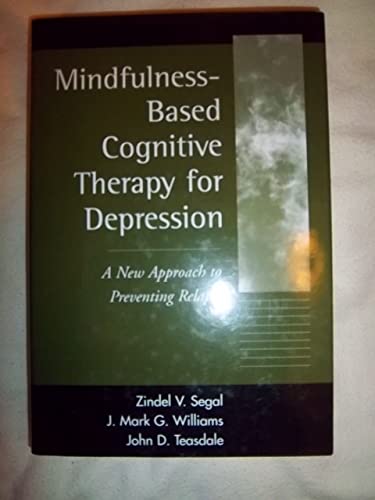


Mindfulness-Based Cognitive Therapy for Depression: A New Approach to Preventing Relapse: 9781572307063: Medicine & Health Science Books @ desertcart.com Review: This is seminal - 2000 years ago Buddhists knew about and taught 'mindfulness meditation'. Within the past 40 years modern western medicine has begun to loosen up towards acceptance of things (practices) that have proven efficacy even if they were not developed by Western medicine. Look around you, now, and you will see reference to 'mindfulness meditation' not only in the mainstream but even in the strangest of places. Mindfulness meditation works, and yes definitely for depression, but it is now standard issue in any physicians medicine bag. This particular book was recommended to me by a member of the Psychiatric staff at Dartmouth Hitchcock Medical Center's psychiatric short term ward when I was a patient there. Review: specific to groups and highly useful - Excellent beginning clinicians book for mindfulness groups. I have been using it in my groups for three years now, and it is helpful and relevant.
| Best Sellers Rank | #1,426,382 in Books ( See Top 100 in Books ) #1,224 in Depression (Books) #2,362 in Social Work (Books) #2,492 in Cognitive Psychology (Books) |
| Customer Reviews | 4.2 4.2 out of 5 stars (41) |
| Dimensions | 5.75 x 1 x 9 inches |
| Edition | First Edition |
| ISBN-10 | 1572307064 |
| ISBN-13 | 978-1572307063 |
| Item Weight | 1.4 pounds |
| Language | English |
| Print length | 351 pages |
| Publication date | November 14, 2001 |
| Publisher | The Guilford Press |
L**Z
This is seminal
2000 years ago Buddhists knew about and taught 'mindfulness meditation'. Within the past 40 years modern western medicine has begun to loosen up towards acceptance of things (practices) that have proven efficacy even if they were not developed by Western medicine. Look around you, now, and you will see reference to 'mindfulness meditation' not only in the mainstream but even in the strangest of places. Mindfulness meditation works, and yes definitely for depression, but it is now standard issue in any physicians medicine bag. This particular book was recommended to me by a member of the Psychiatric staff at Dartmouth Hitchcock Medical Center's psychiatric short term ward when I was a patient there.
L**T
specific to groups and highly useful
Excellent beginning clinicians book for mindfulness groups. I have been using it in my groups for three years now, and it is helpful and relevant.
J**A
Cognitive Therapist Essential
This book is an excellent exposition of Segal, Williams, and Teasdale's therapy using a combination of Meditation, Yoga, and Cognitive Therapy. It very generously shares their program and patient homework notes and would give any therapist the basis for development of their own program.
S**K
Excellent Book even if you do not have Depression
Teaches you in 8 weeks how to stop Depression from recurring by allowing yourself to let your feelings come and go and acknowledging them.
L**O
Excellent book!
I think this book is very helpful and well written. It also comes with a CD with mindfulness exercises. Excellent book!
F**W
CBT rips off the Buddha
CBT theorists tend to present in a lucid fashion ideas that have been therapeutically effective for centuries, or in the case of Mindfulness, millennia. Unfortunately, the authors of this book, in fine CBT tradition, manage yet again to misappropriate the work of others and call it 'a new approach'. There is nothing new in what CBT does, other than to re-label as 'evidence-based' the ideas of other innovators after some dubious random-control trials. If the reader wishes to avoid supporting the political recycling of every other therapy ever created, he/ she would better serve patients, clients and self by reading original texts from, for example, Buddhism, which are more authentically authored than CBT's eclectic bag of techniques. However, as with any heavily funded political movement, I suspect that the CBT movement will continue selling old rope as new as long as we want knowledge served up as fast food. It's enough to make any self-respecting therapist relapse into depression!
A**R
Five Stars
A great read!
P**A
Five Stars
Perfect condition .
S**R
not read it yet but back cover inspired me to buy as i believe in this day ans age we all need a little help
K**N
This is one of the books that helped me come out of a very severe depression/nervous breakdown. I highly recommend investing the time to read this and practice mindfulness meditation. It changed my life.
K**A
This is a very insightful read - book arrived in perfect condition.
B**A
Excellent book, very good delivery service.
M**S
This the MBCT teachers bible!